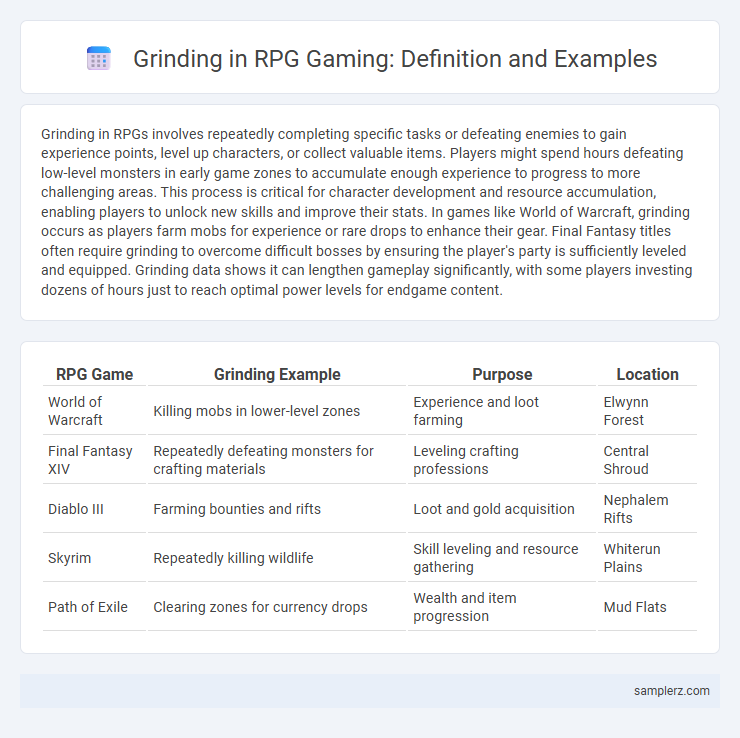Grinding in RPGs involves repeatedly completing specific tasks or defeating enemies to gain experience points, level up characters, or collect valuable items. Players might spend hours defeating low-level monsters in early game zones to accumulate enough experience to progress to more challenging areas. This process is critical for character development and resource accumulation, enabling players to unlock new skills and improve their stats. In games like World of Warcraft, grinding occurs as players farm mobs for experience or rare drops to enhance their gear. Final Fantasy titles often require grinding to overcome difficult bosses by ensuring the player's party is sufficiently leveled and equipped. Grinding data shows it can lengthen gameplay significantly, with some players investing dozens of hours just to reach optimal power levels for endgame content.
Table of Comparison
| RPG Game | Grinding Example | Purpose | Location |
|---|---|---|---|
| World of Warcraft | Killing mobs in lower-level zones | Experience and loot farming | Elwynn Forest |
| Final Fantasy XIV | Repeatedly defeating monsters for crafting materials | Leveling crafting professions | Central Shroud |
| Diablo III | Farming bounties and rifts | Loot and gold acquisition | Nephalem Rifts |
| Skyrim | Repeatedly killing wildlife | Skill leveling and resource gathering | Whiterun Plains |
| Path of Exile | Clearing zones for currency drops | Wealth and item progression | Mud Flats |
What is Grinding in RPGs?
Grinding in RPGs refers to repetitively battling enemies or completing tasks to gain experience points, level up characters, or acquire valuable items. This process often involves defeating low-level monsters or farming resources in specific game areas to improve stats and abilities. Grinding is essential for character progression and unlocking advanced skills, weapons, or questlines in role-playing games.
Classic Examples of Grinding in Iconic RPGs
Classic examples of grinding in iconic RPGs include farming experience points by repeatedly battling low-level enemies in titles like Final Fantasy VII and The Elder Scrolls V: Skyrim. Players often engage in extended combat sessions to level up characters, acquire rare items, or accumulate currency, exemplifying the grind's role in character progression. This repetitive gameplay loop remains a hallmark of RPG mechanics, reinforcing player investment through incremental rewards.
Leveling Up: The Most Common Grinding Technique
Leveling up in RPGs typically involves repetitive combat or quest completion to accumulate experience points (XP) efficiently. Players target specific monsters or areas known for high XP yield and low difficulty to maximize grinding effectiveness. This method enhances character stats and unlocks new skills, crucial for progressing through challenging game content.
Grinding for Rare Items and Loot
Grinding for rare items and loot in RPGs involves repeatedly defeating enemies or completing quests to obtain valuable gear that enhances character stats and gameplay advantages. Players often farm specific monsters or dungeons known for drop rates of legendary weapons, armor, or crafting materials crucial for character progression and competitive play. This method maximizes resource accumulation and improves overall power, serving as a core mechanic for both casual and hardcore RPG enthusiasts.
Skill Point Farming: Building Stronger Characters
In RPGs, Skill Point Farming involves repeatedly completing specific quests or defeating particular enemies to accumulate skill points efficiently. This method allows players to allocate points strategically, enhancing abilities such as combat proficiency, magic power, or crafting skills. Consistent grinding in these areas leads to stronger, more versatile characters capable of tackling advanced challenges.
Reputation Grinding in Faction-Based RPGs
Reputation grinding in faction-based RPGs involves repeatedly completing quests or tasks for specific factions to increase standing and unlock exclusive rewards or storyline content. Players often dedicate extensive hours to farming reputation points through daily missions, combat challenges, or resource gathering within faction territories. This grind enhances character progression and access to unique items, abilities, and faction-specific perks that significantly impact gameplay strategy.
Monster Respawning and EXP Farming Loops
Grinding in RPGs often involves monster respawning mechanics that create continuous EXP farming loops, allowing players to repeatedly defeat enemies for experience points. Specific zones with high spawn rates, such as dense monster fields or dungeon areas, are optimized for efficient leveling. Strategic use of respawn timers and area resets maximizes EXP gain and resource accumulation during extended grinding sessions.
Daily Quests and Routine Grinding
Daily Quests in RPGs provide structured, repeatable tasks that reward players with experience points, in-game currency, and valuable items, promoting consistent character progression. Routine grinding involves repeatedly defeating monsters or gathering resources in specific game areas to enhance skills and accumulate materials essential for crafting or upgrading equipment. This methodical gameplay loop is fundamental for leveling up, unlocking new abilities, and maintaining competitiveness in evolving game worlds.
Currency Grinding: Earning Gold and Resources
Currency grinding in RPGs involves repeatedly completing quests, defeating monsters, or mining resources to accumulate gold and essential items. Players often target high-yield areas or enemy types with valuable loot drops to maximize efficiency and resource gain. Efficient currency grinding supports character upgrades, gear purchases, and crafting, directly enhancing gameplay progression.
Balancing Story Progression with Grinding Sessions
Grinding in RPGs like Final Fantasy XIV often requires players to repeatedly defeat enemies or complete quests to gain experience and level up, balancing character growth with narrative advancement. Efficient grinding sessions are designed around side quests and optional dungeons that enrich story progression without causing player fatigue. Game developers optimize experience points distribution and loot drops to maintain engagement and ensure steady progression through the game's storyline.

example of grinding in RPG Infographic
 samplerz.com
samplerz.com